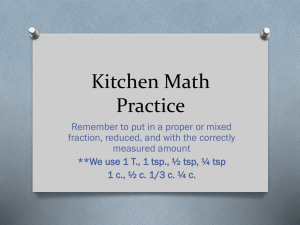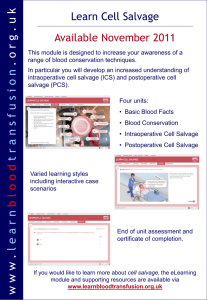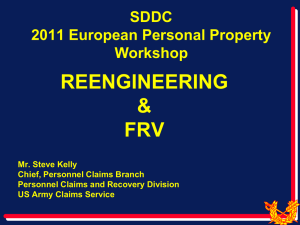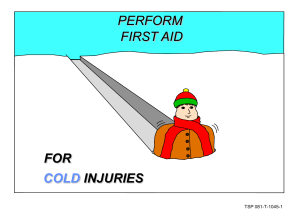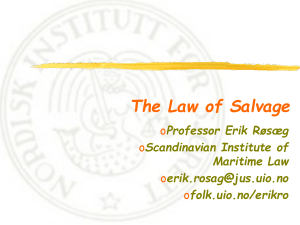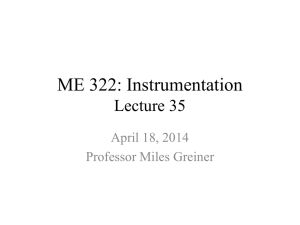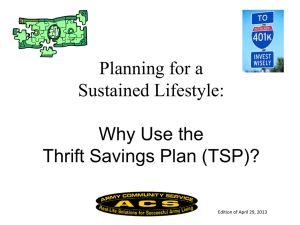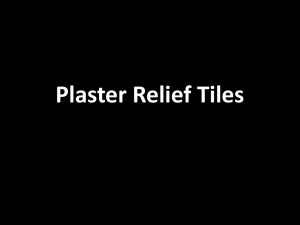Claims Panel
advertisement
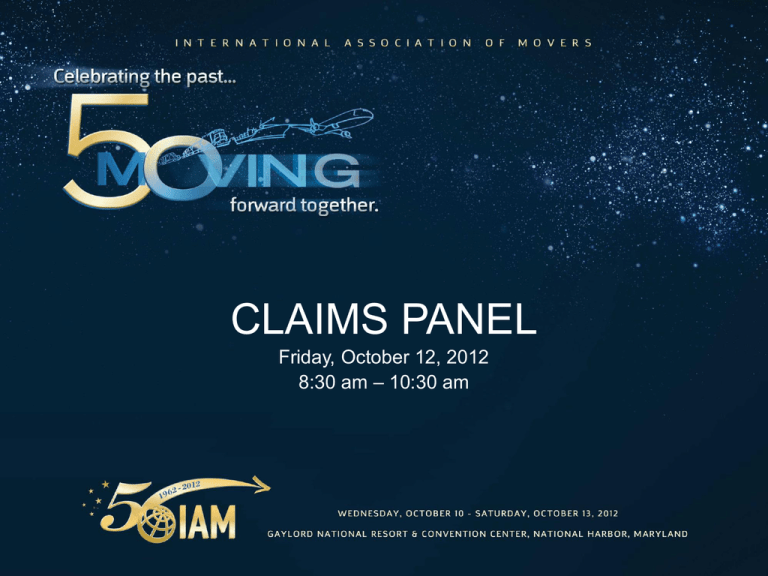
CLAIMS PANEL Friday, October 12, 2012 8:30 am – 10:30 am MARGARET WILKEN Vice Chair, IAM Executive Committee Stevens Forwarders, Inc. TYLER SMITH Senior Manager, Claims & Quality Assurance Government Logistics NV Proposed Mold Business Rules Tyler L. Smith Senior Manager Claims and Quality Assurance Government Logistics N.V. SDDC Subcommittee on Mold • Formed in Feburary 2012. • Military Panel members are from SDDC, AMC, MCO Chiefs/Deputies, Transcom, Army, Air Force, Navy and Marine Corps Transportation Commands, various PPSO’s. • Industry Reps, Tyler Smith (Government Logistics), Kevin Spealman (National Van Lines), Sandra Maier (Jet Forwarding) Why New Business Rules? • Originally the Military Transportation Commands felt that Industry wasn't’t doing enough to prevent mold in shipments. • Marine Corps HQ had led the quest for changes primarily due to a sudden increase in mold damaged shipments. How Mold Damage is Occurring • Code T and J being allowed to sit on uncovered Tarmacs in severe inclement weather for extended time periods. • Shipments coming out of areas with known High Humidity and mold problems (Guam, Okinawa, Japan, Korea etc) • Service Members living in Government Owned Quarters, identified as being sub-standard with mold problems. • Inherent Vice: No water penetration into containers. Proposed Changes • Advance Payments to mitigate shipments such as Code T/J. • Transportation will send QC to physically inspect the contents of containers that appear to be contaminated, if QC does not come out, TSP will be absolved from mitigating the damages. • If PPSO orders testing for Mold, and no Mold is present, PPSO will pay for the testing. Proposed Changes (Cont.) • Customer may refuse items remediated, but will only receive the costs TSP paid or would pay to remediate the item and not FRV. • On shipments where the TSP is relieved of liability “Code T/J”, “Acts of God”, all additional labor, remediation costs, storage, handling, and multiple transport costs will be reimbursed to the TSP. Code T/J Water Damages • Work with your Port Agent – AMC (Airlift Mobility Command) will generally not allow Inspections at the Military Terminal. – Port Agent when breaking down the pallets, must note if any shipping containers are wet or were once wet – Take pictures! Prepare a report! – Port Agent must send the report and pictures to a POC at the AMC Terminal. – Send Pictures and report to the TSP. – Deny Liability if the Port Agent notes water damages and reports it to AMC. Code T/J Shipments • Tim Helenthal of National Van Lines is working with NDTA on the issues with Code T/J Shipments. • Please send him pictures and reports. • tim.helenthal@nationalvanlines.com SALVAGE RIGHTS Salvage Rights • If a TSP pays FRV for an item, they have an absolute right to claim the item as Salvage • Since the beginning of FRV, the MOU on Salvage Rights has been misunderstood and misapplied by both MCO’s and TSP’s. FRV Business Rules • To the extent not prohibited by law or agreement, the TSP is entitled to take possession of and sell for salvage any damaged item on which it has paid either the depreciated or FRV value. • TSP has the right to claim salvage NLT 30 days after receipt of a complete claim from either the owner or MCO. FRV Business Rules • TSP agrees not to claim salvage when the “depreciated” value of all salvageable items is less than $100 or individually $50. • When the customer refuses to allow the TSP to claim salvage or disposes of the item, the TSP will be credited 25% of the depreciated value. Salvage Rights and FRV • The Business Rules on salvage, and the 400NG language clearly states “the TSP is entitled to all items on which it has paid, or agrees to pay, a claim for the total depreciated or full replacement value of the items. • The 25% rule was only to go into effect if the TSP was “unable to exercise its salvage rights due to the “disposal of an item(s) by the military member” – meaning that if the member still had it – the TSP had an absolute right to the item. Salvage Rights and FRV • The original MOU was sort of a remedy of Last Resort for those situations where the TSP tried to collect items for salvage, could not obtain the member's cooperation, the TSP would take 25% off when paying back the MCO on the Demand as per the MOU. • MCO’s have used the MOU on salvage in allowing Service Members to keep items with sentimental value which was never the intent of the MOU. Salvage Rights and FRV • Negotiations are ongoing between Industry and MCO’s concerning salvage rights. • There should be compromise between Industry and the MCO’s when items of sentimental value are involved. Salvage Overseas • Salvage overseas presents difficulties • Military HHG’s are usually imported duty and tax free in to the Host Nation. • Salvage Laws vary from country to country. Salvage Overseas (Cont.) • EUROPE• Germany- If a TSP wants to “salvage” an item, it becomes complicated. • If the TSP wants to resell the item or “donate” it to a charity, the transaction must be reported to the German Zoll Amt (Customs). The Zoll Amt determines a value, and the TSP must pay a 19% VAT based on the Zoll Amts value prior to being able to sell or give the item away. Salvage Overseas (Cont.) • Italy, Spain, Netherlands, England, all have different rules, it pays to understand what your rights are before attempting to exercise your right to salvage. • Forget Turkey, no salvage will occur! Bases belong to the Turks and are controlled by them. Nothing goes on or off the base without the Turkish Military’s approval. Questions ? Tyler L. Smith Government Logistics N.V. tylers@govlog.be KEVIN SPEALMAN Vice President & General Manager National Claims Services Claims Panel Inherent Vice Damage does happen during the move, but TSP is not liable • There is no single agreed upon definition of inherent vice. • All definitions include a provision that the TSP must show that they were free from negligence. • Example of an improper denial would include a TSP that automatically denies all damaged particle board furniture. • Example of a stronger denial could include wine that froze during a shipment. We recently had a case like this, and factors included the TSP’s inability to refuse to ship wine on a government move, the temperatures being subfreezing for several consecutive days, and the fact that no amount of padding or wrapping could have kept the wine from freezing in those temperatures. Claims Panel Inherent Vice Mold Problems and inherent vice – shipments from Okinawa • In addition to the more publicized mold problems on code 5/T shipments, we also had some problems with shipments originating from Okinawa. • In many cases, no mold was noticeable at origin, but existed at destination – so unlike the code 5/T shipments, the mold did apparently develop while shipment was in the care of the TSP • Elevated problems from extremely humid climates with high levels of mold in base housing. • Nothing that the TSP could have reasonably done to prevent the problems. Shipping containers are the perfect environment for mold growth (dark, poor air circulation). Claims Panel Inherent Vice Mold – a known problem in Okinawa Claims Panel Inherent Vice Mold Problems – shipments from Okinawa • We need an agreed upon, specific set of criteria to protect the TSP community from potentially enormous expenditures for claims and mold mitigation costs, on International shipments that develop mold en route, through no fault of the TSP • Criteria could include documentation showing no signs of water ingress, weather reports showing no rain during pick up or delivery, signed statements, etc. • It is ultimately in everybody’s best interest to ensure that TSP’s have some protection from astronomical expenses for damages completely beyond their ability to prevent. Claims Panel High Value/High Risk Forms Failure to properly utilize HV/HR Forms is hurting some TSP’s • There is a failure to distinguish between High Value and High Risk • Make it agent’s responsibility at packing to ensure inclusion of high risk items • Use numbered security seals • Items must go on both the regular inventory and the HV/HR • Forms must be signed at destination, AND each item initialed in right hand column, indicating that the items were unpacked, and were verified as received by the customer. BRETT COAKLEY Attorney-Advisor U.S. Air Force Claims Service Center VIRGINIA EILMUS U.S. Navy Military Claims Office STEVEN R. KELLY Chief of Personnel Claims Branch U.S. Army Military Claims Office CLAIMS PANEL Friday, October 12, 2012 8:30 am – 10:30 am
